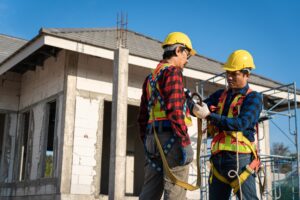A general contractor hires a roofer to do what roofers do for several homes he is building. The GC hasn’t done business with this particular roofer (we’ll call him Joe’s Roofing, LLC) but has asked around locally and heard only good things about Joe’s. Our GC obtains certificates of insurance, signs an agreement with Joe’s and is named additional insured on all Joe’s policies. All is well. Then, shortly after Joe’s Roofing begins work on the first home, a worker falls two stories while working unsupervised on a Sunday. The injured worker was not wearing a safety harness, and no one knew he was on the jobsite. In fact, no one was supposed to be working. Worse, the GC is soon informed that Joe’s worker’s comp policy had been cancelled for non-payment of premium a few days after the agreement was signed.
As days pass slowly by, more bad news arrives. The injured worker is deemed permanently and totally disabled. He will never work again. Disability, medical and lost wage benefits that are required by law under worker’s comp are not available because Joe’s policy was canceled at the time of the accident. But that’s just the start of the bad news for our GC. The injured worker is suing the GC for negligence. He alleges Joe’s Roofing was not required to provide safety harnesses to their workers. This is a worksite safety issue for which the GC is ultimately responsible. It is further alleged the GC failed to advise Joe’s that the jobsite was closed that Sunday and that unsupervised workers were not allowed on the premises.

Of course, this is a worst case. It is impossible to finish the story because there are so many scenarios to consider. What defines an employee versus an independent contractor can come into play. Such issues vary considerably from one place to another. The important things to remember: know your subs. Don’t take for granted they will always care for their own employees or jobsite safety. In this example, our GC could have protected himself by confirming that Joe’s Roofing had safety harnesses and used them. He could have improved and documented communication of jobsite safety rules and procedures. If no one is to work unsupervised and if there are times when the jobsite is closed, there should be no doubt in anyone’s mind and no opportunity for a claimant’s attorney to allege negligence. Discussing these matters at regular safety meetings, where attendance is required and documented, can mitigate claims of negligence.
An old saying goes “expect the best but prepare for the worst.” There is no way to entirely protect yourself from all circumstances, but you can take reasonable steps to minimize their impact.
For more information on worker’s comp please see our Frequently Asked Questions at https://rwcinsuranceadvantage.com/products/faqs/.

